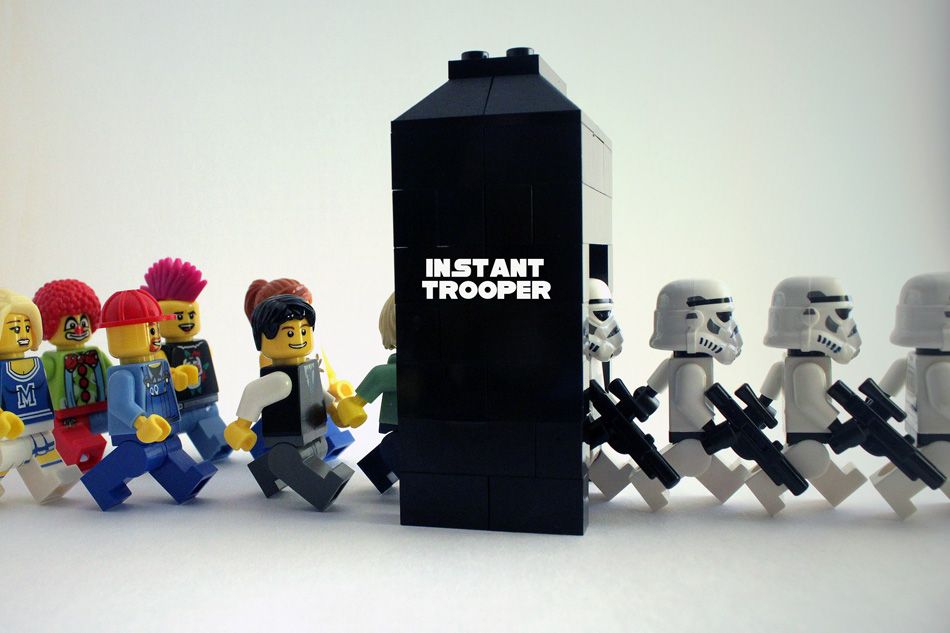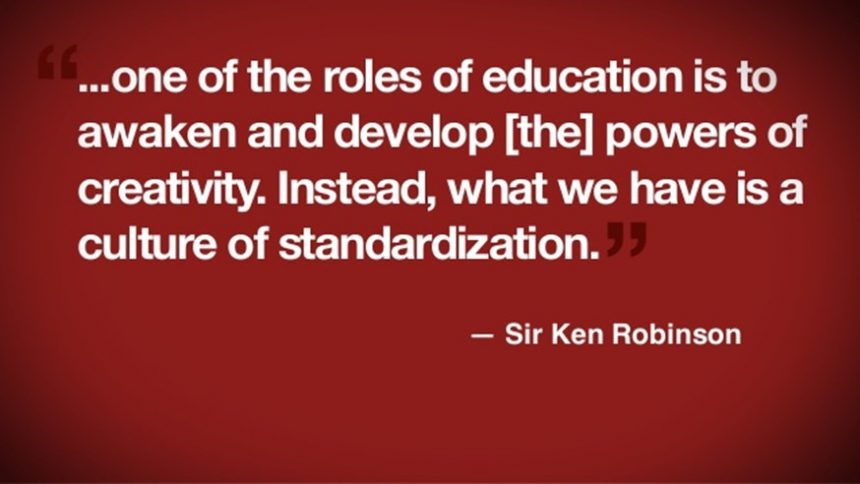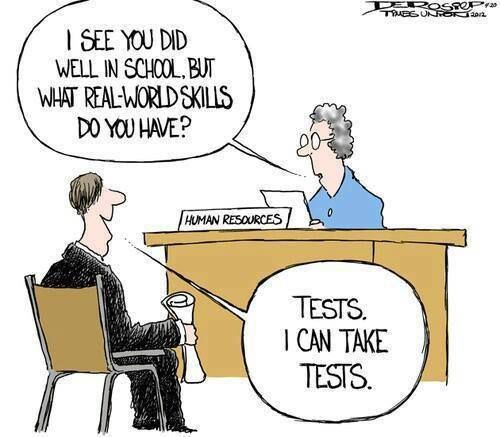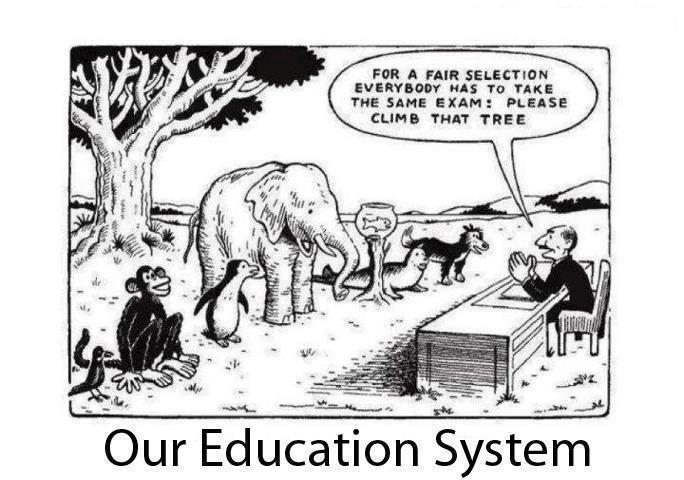“These aren’t the droids you’re looking for”. Why educators & employers need a new hope.

It was back in 1977 when the Star Wars character Ben Kenobi uttered the phrase ‘these aren’t the droids you’re looking for’ when using a Jedi mind trick to persuade Stormtroopers to let them pass.
Thinking about our highly regulated system of compulsory education in the UK with its dominant culture of standard assessment, burdensome regulation and scrutiny it’s hardly surprising that often employers are struggling to find suitable candidates to be part of their business. To create employer ready students, educators need a new hope.
I once had the privilege to hear a lecture by well-known Historian Professor Carl Chinn OBE about the Industrial Revolution and how it was driven by making what the world wants. My contention is that in the fourth industrial revolution we need to produce the people that the world wants.
Technology is a key part of this story also because it’s changing the way that we meet and connect with people along with how we nurture relationships, and in the business world the ability to build effective relationships is critical. It is therefore important that we examine how we are preparing young people to be what the world wants, and standardised tests are clearly not helping.
Accountability for employability does not reside with educators, but rather with a system that is not working. Standardised tests do not work well for people not least because as Sir Ken Robinson has noted, people are not standardised. To be successful in the commercial world requires a set of characteristics and skills that cannot be nurtured through a dominant process of standard testing, so we need to take a different approach.

Like a lot of people with a love of learning, I read a lot. I once read the entire works of Charles Dickens in quite a short time and I think I’ve only recently fully recovered. I especially love to read about business and trends taking place in our rapidly evolving world because at its core that is all about people.
Of all the books I’ve read it was one published back in 1936 that was perhaps the most profound, and it was written by a man born into poverty on a farm in Missouri with little formal education. That man was Dale Carnegie. His book, ‘How to Win Friends and Influence People’ revealed Carnegie’s profound insights into the behaviour of others and most importantly the ability to change those behaviours by modifying our personal behaviours.
For anyone seeking to be successful in business, the ability to influence in this way has obvious commercial power when wielded with integrity.

Carnegie’s book went on to sell over 30 million copies and can still be purchased today. I once suggested to an education Board that they should buy a copy for every student, but my suggestion was not well received at the time (it would have been money well spent in contrast to many of the alternatives).
I stand by that recommendation today not least because our education system is producing people who are often not as employable as the commercial world needs. Let’s explore this in more detail.
Interviewing people is an enlightening experience, just ask any HR practitioner, especially when it comes to employability which is often defined as ‘a set of achievements, understandings and personal attributes that make individuals more likely to gain employment’.
Achievements and understandings can be assessed and depending on the context will have variations in importance, but it’s the personal attributes that are perhaps the critical success here.
Education as a sector is often held accountable, especially in the popular press, for graduates lacking appropriate employability skills but the real issue is more complex.
We can’t hold teachers accountable for employability when they didn’t choose the policies any more than we can hold a soldier accountable for a war they didn’t choose to fight.
We need to take a new approach.
Having spent more than a decade in the Boardrooms of education I know first-hand the vast array of complex challenges facing those working within the system, especially in the UK.
In recent years educators have seemingly been held accountable not just for managing tightening budgets whilst increasing standards in a culture dominated by measurement and external scrutiny, but in addition have somehow also found themselves responsible for dealing with an increasing list of issues including childhood obesity, mental health, poverty and apparently international terrorism. Gosh, how did it all get so weirdly complicated?
We don’t hold Doctors accountable for broken limbs, yet the same principle appears to have infected the teaching profession. Perhaps it is time to push back.
Amongst this complexity one of the most significant factors impacting on employability is our system of excessive testing along with internal and external scrutiny. To be successful in the world, we need to produce people who are what the world needs and the kind of people others want to be around. It is difficult to see how standardised testing can achieve this outcome from an employer’s perspective.
You can’t measure your way to success.

Thinking you can measure your way to success is akin to believing you will grow by measuring your height. The correlation is not what many would argue it to be, and often neither is the causality.
This is an inconvenient truth for those wedded to the dogma of standardised testing. Business needs resilient people with a growth mindset and exemplary interpersonal skills who are passionate about what the business is passionate about. Enthusiasm, if sincere, can be infectious and when combined with resiliency, purpose and the ability to execute this can be a winning combination in business. I am not aware of a single standardised test that nurtures any of those qualities, but let’s examine what others in the commercial world think.
TopResume reported a LinkedIn survey of more than 300 hiring managers regarding what employers were seeking. Communication skills were ranked highly, specifically the ability to get on with others.
Dale Carnegie once said that ‘You can make more friends in two months by becoming interested in other people than you can in two years by trying to get other people interested in you’. People skills in business are essential and they can’t be assessed through a standardised test. Personality matters.
Advanced organisation skills were also highlighted in the survey along with teamwork. Organisation skills may well lend themselves more to a standardised test but teamwork requiring the ability to build cohesive high-performance teams less so.
Critical thinking was ranked highly also, something that has been defined as a ‘sort of mental attitude about critical thinking and curiosity. It’s about a mindset of looking at the world in a playful and curious and creative way’. Curiosity may not have been great for the cat but for those seeking higher value employment it’s a prerequisite.
Education. It’s a testing business.

So how did we get to such an industry of testing? In short it has little to do with academically rigorous evidence that it supports pedagogy that has positive impact, and far more to do with money. Lots of it.
Not only is the standardised testing market worth hundreds of millions of pounds, but the real value isn’t the tests themselves. Rather it’s the wider preparatory materials that parents buy to help their kids to pass them.
Even back in 2015 Huffington Post reported this industry to be worth over $13 billion. A staggering amount of money. Standardised testing in education is not a benign thing. This isn’t good for education, for the staff in education, for students in education but also it isn’t good for business (unless you’re in the standardised testing business). There is a better way.
Look to Finland
Finland is widely regarded as having one of the best education systems in the world. It’s something of a myth that Finland has no standardised testing. They do, it’s just they have one throughout the whole of the primary and secondary education stages. Even then this test is more intelligent than Western testing requiring creative cross-disciplinary thinking to solve real world issues.
In Finland there is less homework and greater emphasis on personal creative development, especially through play. Often this is time spent with others creatively, great preparation for the world of work.
Certainly, in my commercial life, I have never been faced with a challenge that requires me to lock myself away in isolation, hand in all technology that would be useful in solving the problem and then not to speak to anyone about it. The world of business is largely anathema to almost every aspect of standardised testing.
In Finland the College and University system is also free, enabling a greater diversity of students to pursue their abilities further and higher without economic barriers. Finally, teachers are held in very high regard and trusted to exercise their personal judgement in enabling others. It works.
The World Economic Forum ‘Future of Jobs’ report has indicated that by 2020 what the world will need are skills relating to sociability, critical thinking (there is it again), collaboration and creativity. Those same themes appearing time and time again.
For my part, I see technology as a major enabler in supporting a shift towards these more valuable personal attributes. A number of cloud-based technologies available to educators are now collaborative by design, enabling educators to design tasks that more easily embed the effective use of technology with critical and collaborative working.
The same technologies also enable teachers to bring together multi-disciplinary ways of working and diverse learning styles tailored to the student, not the other way around. To do this teachers will need the support of a range of stakeholders and an environment that is supportive of progressive pedagogical practice. In Finland it would be called phenomenon-based learning. It’s worth looking at as it’s phenomenally successful.
Meeting this challenge will require a shared multi-agency responsibility for providing graduates that the world wants without placing disproportionate blame on any one element for current failings.
Drawing on the wisdom of Dale Carnegie once more, ‘Instead of condemning people, let’s try to understand them. Let’s try to figure out why they do what they do. That’s a lot more profitable and intriguing than criticism; and it breeds sympathy, tolerance and kindness’.
We won’t change the system overnight, but we can all work together to nudge it more towards the critical commercial skills that will foster greater capacity for collaboration, creativity and curiosity with a purpose.
If we do that, the current dominance of standardised testing and measurement will be exposed for its failure to create the skills and characteristics required by the fourth industrial revolution, so we can once again move to a position where we are proud to be producing what the world wants.
Back in 1977 which now feels like a long time ago in a galaxy far, far away there was no internet as we know it today and business models were very different. The fourth industrial revolution needs people with the creative collaborative ability to drive forward innovation that will generate new higher value-added industries.
For those with a vested interest in maintaining the industry of standardised testing, we will end how the article began with a Star Wars reference, this time from Shmi Skywalker, ‘You can’t stop change any more than you can stop the sun from setting’.
The change in the world will expose the failings of standardised testing to create people that the world wants, and in doing so will offer both educators and employers a new hope. Our collective task is to work together to enable it.
Jamie E Smith, Executive Chairman, C-Learning












Responses